From the Prophet Ezekiel:
[God said to Ezekiel] “You shall eat it as a barley-cake, baking it in their sight on human dung.”
(From the Daily Office Lectionary – Ezekiel 4:12 (NRSV) – May 13, 2013.)
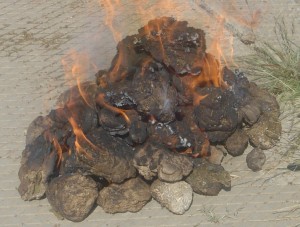 Today’s Old Testament reading is a disturbing piece in which the Prophet Ezekiel is instructed to lie down for several days (in fact, for more than a year) as a sign of the number of years Israel and then Judah will be punished.
Today’s Old Testament reading is a disturbing piece in which the Prophet Ezekiel is instructed to lie down for several days (in fact, for more than a year) as a sign of the number of years Israel and then Judah will be punished.
While lying down, he is to make grain cakes from specific measures of spelt, millet, wheat, barley, lentils, and beans, and he is to drink specific measures of water each day. This is to symbolize that during their punishments, the Israelites and the Judeans will lack bread and water; they will experience poverty and deprivation, and “look at one another in dismay, and waste away under their punishment.” (v. 17)
The selected verse is from God’s instructions to Ezekiel on how he is to prepare and bake his grain cakes, representative of the way in which the soon-to-be-exiled People of God will have to cook their food during their banishment.
The very thought of cooking with excrement must have been shocking to Ezekiel who objected and was given leave to use cow dung rather than human excreta. It would have been shocking in the extreme to people whose God had commanded them to cover their bodily wastes immediately after defecation because the very sight of it was offensive to God:
You shall have a designated area outside the camp to which you shall go. With your utensils you shall have a trowel; when you relieve yourself outside, you shall dig a hole with it and then cover up your excrement. Because the Lord your God travels along with your camp, to save you and to hand over your enemies to you, therefore your camp must be holy, so that he may not see anything indecent among you and turn away from you.
The “designated area outside the camp,” though initially commanded as the latrine, was where everything unclean was to be disposed: the offal of sacrificed animals, warriors’ garments soiled with the blood the enemy, the stones of houses in which plague has been found, and the idols and altars of other nations are all commanded in the Law to be taken there. Persons deemed unclean because of leprosy, menstruation, issue of semen, or slaughter of animals were sent outside the camp. The “designated area outside the camp” was a place of defilement, uncleanness, impurity, corruption, dirtiness, filthiness, pollution, contamination, condemnation, punishment, rejection, castigation, and reproach. It is where disease, dung, and death were. To cook one’s food over excrement wasn’t simply distasteful, it was to imbue one’s nourishment with everything foul and unholy from the “designated area.” The smoke from a cooking fire of whatever fuel flavors anything cooked upon it; the smoke from a fire of human feces would pollute everything cooked over it.
In modern kitchens where we cook on electric burners or over clean natural gas flames, we no longer appreciate how the cooking fuel affects the flavor of the food. Many years ago, the summer of 1969 to be exact, I went to study in Florence, Italy. Upon arrival, I discovered that my pensione (boarding house) would not have a room for me until the next day. So, I checked into a small bed-and-breakfast hotel where I was offered an evening meal of chicken cacciatore. Having no other plans, I accepted. Unfortunately, the hotel kitchen used a kerosene stove. Chicken cacciatore cooked over kerosene is inedible; so too (I discovered the next morning) is coffee.
On the other hand, several years later, I had occasion to rent a cottage near the River Shannon in Ireland. It was heated by a peat stove and on that stove I could also boil water for my breakfast tea. Although I prefer coffee, one does want to be traditional occasionally when living in a 200-year-old, turf-fire-heated Irish farm cottage. My tea tasted of peat, which was an odd flavor, but not an inedible one (like kerosene). By the end of my month there everything I owned – my luggage, my books, all my clothing – smelled of peat. A couple of weeks later, touring a whisky distillery on the Isle of Skye, I discovered that good Scotch whisky (the malt for which is toasted over open peat fires) reminds me of my Irish cottage and, especially, of my morning tea.
I cannot imagine what food cooked over human feces might taste like, and I certainly do not want to find out! Apparently I’m not alone: a couple of years ago, a Japanese scientist perfected a method of making a vegan meat substitute using proteins extracted from human waste. Of over 12,500 who responded to an internet survey, 76% said there was no way they would even try the substance and another 11% said they were unsure whether they would. We can be very sure that the Israelites and the Judeans would not have wanted to; even the thought (or the threat) of eating food cooked over excrement was a religious affront to them.
However it might have tasted, the prophetic meaning is clear: food cooked over human feces is a symbol of abject poverty and want. It is a symbol of something unclean and contaminated to be avoided, not only for ourselves but for everyone. Poverty and deprivation are an abomination; any system which creates them should be viewed as corrupt and filthy, as economic excrement, as financial feces. It does not matter what name we may give such systems — capitalist or communist, socialist or fascist — if the success of the financial institutions created by those systems depends upon human beings being made destitute, those institutions and the system which creates them should be relegated to the “designated area outside the camp.” Like the smoke from a cooking fire of human dung, they pollute everything they touch. They are, simply put, shit not fit for human society.
====================
A request to my readers: I’m trying to build the readership of this blog and I’d very much appreciate your help in doing so. If you find something here that is of value, please share it with others. If you are on Facebook, “like” the posts on your page so others can see them. If you are following me on Twitter, please “retweet” the notices of these meditations. If you have a blog of your own, please include mine in your links (a favor I will gladly reciprocate). Many thanks!
====================
Father Funston is the rector of St. Paul’s Episcopal Church, Medina, Ohio.
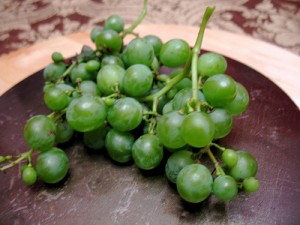 I’m not the least bit sure I like the last thought of Jesus reply . . . Is he suggesting that a loving God caused this innocent man’s blindness so that Jesus could come along and heal him with some mud made of spittle and demonstrate his power? I mean, really, is he? I don’t want to get into that today, but surely there must be another interpretation for Jesus words and perhaps someday I’ll explore that.
I’m not the least bit sure I like the last thought of Jesus reply . . . Is he suggesting that a loving God caused this innocent man’s blindness so that Jesus could come along and heal him with some mud made of spittle and demonstrate his power? I mean, really, is he? I don’t want to get into that today, but surely there must be another interpretation for Jesus words and perhaps someday I’ll explore that.  I wonder if Jesus had this prophecy in mind when he called Andrew and Peter and said to them, “Follow me, and I will make you fish for people.” (Matt. 4:19)
I wonder if Jesus had this prophecy in mind when he called Andrew and Peter and said to them, “Follow me, and I will make you fish for people.” (Matt. 4:19) Our first reading this morning is from a little book from the Apocrypha called The Book of Wisdom. At one time church tradition ascribed authorship to King Solomon, but it is now believed to have been written sometime in the first or second century before Christ by a Greek-speaking Jew of the Diaspora. It is found in the Greek-language version of Jewish scriptures, not in the Hebrew version, and is therefore not considered as canonical scripture by Jews or by Protestants. Roman Catholics and the Eastern Orthodox do accept it, and we Anglicans take a middle course, saying that we read them “for example of life and instruction of manners; but yet [we do] not apply them to establish any doctrine.” (Articles of Religion, Art. VI, BCP 1979, pg. 868). Well, here’s an example of life, then:
Our first reading this morning is from a little book from the Apocrypha called The Book of Wisdom. At one time church tradition ascribed authorship to King Solomon, but it is now believed to have been written sometime in the first or second century before Christ by a Greek-speaking Jew of the Diaspora. It is found in the Greek-language version of Jewish scriptures, not in the Hebrew version, and is therefore not considered as canonical scripture by Jews or by Protestants. Roman Catholics and the Eastern Orthodox do accept it, and we Anglicans take a middle course, saying that we read them “for example of life and instruction of manners; but yet [we do] not apply them to establish any doctrine.” (Articles of Religion, Art. VI, BCP 1979, pg. 868). Well, here’s an example of life, then: What happened one thousand nine hundred and seventy-nine years ago?
What happened one thousand nine hundred and seventy-nine years ago?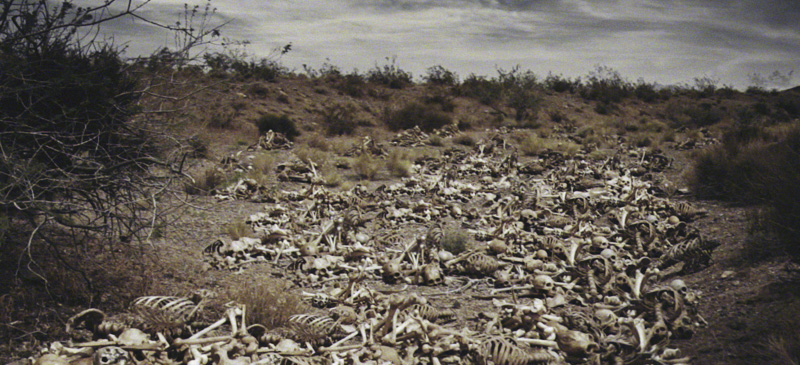
 If so, then receive it. [Each congregant was given a bottle of water when they entered the church.] I want you to give your bottle of water to someone whom you think might need some spiritual refreshment; and I want you to accept a bottle of water from someone who thinks you might need some spiritual refreshment. Let these bottles of water remind you that you are a source of refreshment to others, and that through others God provides you with spiritual renewal.
If so, then receive it. [Each congregant was given a bottle of water when they entered the church.] I want you to give your bottle of water to someone whom you think might need some spiritual refreshment; and I want you to accept a bottle of water from someone who thinks you might need some spiritual refreshment. Let these bottles of water remind you that you are a source of refreshment to others, and that through others God provides you with spiritual renewal.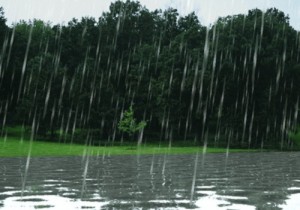 It rained here last night – pretty spectacular electrical storm, to be honest. The dog spent the night cowering under a table. This morning when I took her out at 6 a.m. the world was freshly washed. In the trees surrounding our home, birds of all sorts were singing and there was a sweetness in the air. Sprinkles with clean water, the earth had been cleaned of its uncleannesses, if only for a moment. ~ It is only a coincidental convergence of the two lectionaries (Episcopal Daily Office two-year cycle with the Revised Common Lectionary three-year cycle), but tomorrow’s Old Testament lesson is Ezekiel’s vision of the valley of dry bones in the next chapter of his prophecy. Dry bones, dessicated, dehydrated – emblematic of spiritual emptiness. Clean water, washing, witnessing, revivifying – emblem of the Spirit herself. ~ Tomorrow we will baptize and welcome into God’s household a young lady of about 10 years of age. I find it difficult to conceive of her having “a heart of stone” but I am convinced that in her baptism God will give her a new heart and write on her heart his law of love. Her life will become like the world after the rain, freshly washed and filled with light and sweetness. This is not to say that there will not be dry patches in her life; there are in every life, even the lives of the saints. However, nurtured by the church and sustained by the Spirit, she will be able to make it through those times with more than enough spiritual “moisture”. The Psalms constantly remind us that “the river of God is full of water” (65:9) and that God changes “deserts into pools of water and dry land into water-springs” (107:35). ~ In another vision, Ezekiel saw a river of water flowing from the temple. It flooded the land, in places ankle-deep, in others knee-deep, and in still others waist-deep. The water flowed everywhere and everywhere it flowed was to be the land of God’s people, not just Israel, but all of God’s people. The dry bones of all nations will be restored in the water of God’s river; God will sprinkle clean water upon us all. We call this baptism.
It rained here last night – pretty spectacular electrical storm, to be honest. The dog spent the night cowering under a table. This morning when I took her out at 6 a.m. the world was freshly washed. In the trees surrounding our home, birds of all sorts were singing and there was a sweetness in the air. Sprinkles with clean water, the earth had been cleaned of its uncleannesses, if only for a moment. ~ It is only a coincidental convergence of the two lectionaries (Episcopal Daily Office two-year cycle with the Revised Common Lectionary three-year cycle), but tomorrow’s Old Testament lesson is Ezekiel’s vision of the valley of dry bones in the next chapter of his prophecy. Dry bones, dessicated, dehydrated – emblematic of spiritual emptiness. Clean water, washing, witnessing, revivifying – emblem of the Spirit herself. ~ Tomorrow we will baptize and welcome into God’s household a young lady of about 10 years of age. I find it difficult to conceive of her having “a heart of stone” but I am convinced that in her baptism God will give her a new heart and write on her heart his law of love. Her life will become like the world after the rain, freshly washed and filled with light and sweetness. This is not to say that there will not be dry patches in her life; there are in every life, even the lives of the saints. However, nurtured by the church and sustained by the Spirit, she will be able to make it through those times with more than enough spiritual “moisture”. The Psalms constantly remind us that “the river of God is full of water” (65:9) and that God changes “deserts into pools of water and dry land into water-springs” (107:35). ~ In another vision, Ezekiel saw a river of water flowing from the temple. It flooded the land, in places ankle-deep, in others knee-deep, and in still others waist-deep. The water flowed everywhere and everywhere it flowed was to be the land of God’s people, not just Israel, but all of God’s people. The dry bones of all nations will be restored in the water of God’s river; God will sprinkle clean water upon us all. We call this baptism. These three similes – I am like a vulture in the wilderness; I am like an owl in the ruins; I am like a lonely sparrow – intrigue me. They are metaphors of solitude but worse than solitude, of loneliness, of being completely cut off. ~ The word translated as “vulture” in the NRSV is qa’ath; older translations rendered this as “pelican”. According to the lexicon the word signifies “a ceremonially unclean bird”, but the lexicon admits that the exact meaning of the ancient Hebrew is unknown. The root of the word is qow’ which means “to vomit”. From some bit trivia learned long ago, I recall that vultures defend themselves with intentional projectile vomiting. The simile depicts one so distraught , so distressed, so stricken that she keeps others away, spewing her grief onto those who would comfort her. ~ The Hebrew word translated as “owl” is kowc: owls also are ritually unclean birds. The lexicon tells us that it is “from an unused root meaning to hold together.” This simile perhaps suggests the same thing as the English phrase “barely holding it together”; amidst the waste and devastation of his life, the psalmist is barely holding on, hanging from his last thread, unable to handle one more thing even a small expression of sympathy and support without “losing it altogether.” ~ In the third simile, the psalm uses the word tsippowr, here translated as “sparrow” although more generically it simply means “bird”. This simile holds out hope where the others do not. The same word is used by prophet Ezekiel to paint a picture Jesus will later use as an encouragement to faith: “On the mountain height of Israel I will plant [a cedar], in order that it may produce boughs and bear fruit, and become a noble cedar. Under it every kind of bird will live; in the shade of its branches will nest winged creatures of every kind.” (Ezek. 17:23) Jesus will change the cedar to a mustard tree and promise that even the smallest amount of faith, faith the size of a mustard seed, can accomplish miracles. (Matt. 13:31-32; Matt. 17:20) For the lonely sparrow on the house-top there is the hope of flocking with others in tree planted by the Lord; for the lonely sparrow there is the hope provided by faith. ~ The rest of the morning psalm expresses that hope. The psalmist acknowledges gratefully that God “will look with favor on the prayer of the homeless; he will not despise their plea” and “their offspring shall stand fast in [God’s] sight.” No matter how cast out, unclean, despairing, or distraught, even the vulture and the owl, together with the sparrow, can come and make nests in the branches of the tree planted by God.
These three similes – I am like a vulture in the wilderness; I am like an owl in the ruins; I am like a lonely sparrow – intrigue me. They are metaphors of solitude but worse than solitude, of loneliness, of being completely cut off. ~ The word translated as “vulture” in the NRSV is qa’ath; older translations rendered this as “pelican”. According to the lexicon the word signifies “a ceremonially unclean bird”, but the lexicon admits that the exact meaning of the ancient Hebrew is unknown. The root of the word is qow’ which means “to vomit”. From some bit trivia learned long ago, I recall that vultures defend themselves with intentional projectile vomiting. The simile depicts one so distraught , so distressed, so stricken that she keeps others away, spewing her grief onto those who would comfort her. ~ The Hebrew word translated as “owl” is kowc: owls also are ritually unclean birds. The lexicon tells us that it is “from an unused root meaning to hold together.” This simile perhaps suggests the same thing as the English phrase “barely holding it together”; amidst the waste and devastation of his life, the psalmist is barely holding on, hanging from his last thread, unable to handle one more thing even a small expression of sympathy and support without “losing it altogether.” ~ In the third simile, the psalm uses the word tsippowr, here translated as “sparrow” although more generically it simply means “bird”. This simile holds out hope where the others do not. The same word is used by prophet Ezekiel to paint a picture Jesus will later use as an encouragement to faith: “On the mountain height of Israel I will plant [a cedar], in order that it may produce boughs and bear fruit, and become a noble cedar. Under it every kind of bird will live; in the shade of its branches will nest winged creatures of every kind.” (Ezek. 17:23) Jesus will change the cedar to a mustard tree and promise that even the smallest amount of faith, faith the size of a mustard seed, can accomplish miracles. (Matt. 13:31-32; Matt. 17:20) For the lonely sparrow on the house-top there is the hope of flocking with others in tree planted by the Lord; for the lonely sparrow there is the hope provided by faith. ~ The rest of the morning psalm expresses that hope. The psalmist acknowledges gratefully that God “will look with favor on the prayer of the homeless; he will not despise their plea” and “their offspring shall stand fast in [God’s] sight.” No matter how cast out, unclean, despairing, or distraught, even the vulture and the owl, together with the sparrow, can come and make nests in the branches of the tree planted by God.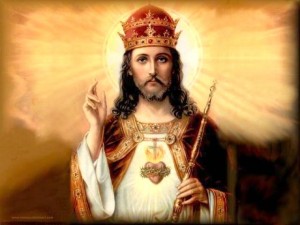 Another reading of that proclamation is “Repent, for the kingdom of heaven is at hand.” To my hearing, this alternative version is a bit more imperative; the kingdom seems a bit more imminent when it is “at hand” rather than simply has “come near.” We used to live in that part of northeastern Kansas known as “tornado alley”. If we said a tornado had “come near” that was as good as saying “It missed us! It didn’t hit us.” On the other had, if someone had said a twister was “at hand”, I would have thought it was coming right at our front door! So . . . theologically I prefer the latter reading, but must confess that personally I breathe a sigh of relief if the kingdom merely has come near. A miss, after all, is as good as a mile, and it gives me time to do this repenting and reforming that Jesus calls for. ~ So what is this “kingdom of heaven”? Let’s get one thing clear right off the bat – it is not something different from the “kingdom of God”. Some try to make a distinction (like the notes in the Scofield Reference Bible towards which I acknowledge great antipathy), but a comparison of the gospels demonstrates that they are the same thing (compare these verses: Matthew 4:17 with Mark 1:14-15; Matthew 5:3 with Luke 6:20; Matthew 13:31 with Mark 4:30-31). ~ This kingdom also is not a place far away or near by. The Greek here is basileia ; the Hebrew for the same concept in the Old Testament (e.g., Ps. 103:19) is malkuwth. While both can refer to a physical place, an actual nation state, they are better understood to refer to a condition or fact or authority of sovereignty or dominion; they might better be translated is “rule” or “reign”. This kingdom also is not a time – past or present or future. It isn’t some place or state or condition at which we arrive after death; it isn’t some place or state or condition which will arrive on earth at some future time. So what is it? ~ Well . . . in Luke’s gospel, Jesus is asked by the Pharisees about the signs of the kingdom’s arrival, to which he replies, “The kingdom of God is not coming with signs to be observed; nor will they say, ‘Look, here it is!’ or, ‘There it is!’ For behold, the kingdom of God is in your midst.” (Luke 17:20-21) The Greek here is entos which means (and in other versions is translated literally as) “within you”. Other things the Christian scriptures tell us are found within human beings are the “word of Christ” richly dwelling (Col. 3:16), spiritual gifts (1 Tim. 4:14), and sincere faith (2 Tim. 1:5). The Hebrew scriptures mention peace (e.g., Ps. 12:8), God’s commandments (Prov. 7:1), and “a new heart and a new spirit” (Ezek. 36:26). In other words, the kingdom is an internal, spiritual characteristic of human beings characterized by these things. That’s coming about as “near” as you can get! That’s even more imminent than being “at hand.” If it’s within me, within you, within us, right here in the midst of us . . . that’s a matter of some urgency! We’d best be paying attention to it. ~ It is also characterized by the things revealed in the eight “kingdom parables” of Matthew 13, but that is too much to write about in a short meditation on a sunny day. I’ll leave those to the reader’s own contemplation. ~ Just one final note . . . if the kingdom (in all its characteristics) is truly within a person (or within a community), it will be very apparent by that person’s (or community’s) outer actions, his or her (or their) conduct, his or her (or their) relationships with others and the whole of creation. Here, the words of the Letter of James apply: “Faith by itself, if it has no works, is dead. But someone will say, ‘You have faith and I have works.’ Show me your faith apart from your works, and I by my works will show you my faith.” (James 2:17-18) If the kingdom of heaven is truly within, truly come near, truly at hand in the lives of Christ’s followers, then it will be made clear in works of mercy. I think that’s the repentance and reformation Christ encourages here.
Another reading of that proclamation is “Repent, for the kingdom of heaven is at hand.” To my hearing, this alternative version is a bit more imperative; the kingdom seems a bit more imminent when it is “at hand” rather than simply has “come near.” We used to live in that part of northeastern Kansas known as “tornado alley”. If we said a tornado had “come near” that was as good as saying “It missed us! It didn’t hit us.” On the other had, if someone had said a twister was “at hand”, I would have thought it was coming right at our front door! So . . . theologically I prefer the latter reading, but must confess that personally I breathe a sigh of relief if the kingdom merely has come near. A miss, after all, is as good as a mile, and it gives me time to do this repenting and reforming that Jesus calls for. ~ So what is this “kingdom of heaven”? Let’s get one thing clear right off the bat – it is not something different from the “kingdom of God”. Some try to make a distinction (like the notes in the Scofield Reference Bible towards which I acknowledge great antipathy), but a comparison of the gospels demonstrates that they are the same thing (compare these verses: Matthew 4:17 with Mark 1:14-15; Matthew 5:3 with Luke 6:20; Matthew 13:31 with Mark 4:30-31). ~ This kingdom also is not a place far away or near by. The Greek here is basileia ; the Hebrew for the same concept in the Old Testament (e.g., Ps. 103:19) is malkuwth. While both can refer to a physical place, an actual nation state, they are better understood to refer to a condition or fact or authority of sovereignty or dominion; they might better be translated is “rule” or “reign”. This kingdom also is not a time – past or present or future. It isn’t some place or state or condition at which we arrive after death; it isn’t some place or state or condition which will arrive on earth at some future time. So what is it? ~ Well . . . in Luke’s gospel, Jesus is asked by the Pharisees about the signs of the kingdom’s arrival, to which he replies, “The kingdom of God is not coming with signs to be observed; nor will they say, ‘Look, here it is!’ or, ‘There it is!’ For behold, the kingdom of God is in your midst.” (Luke 17:20-21) The Greek here is entos which means (and in other versions is translated literally as) “within you”. Other things the Christian scriptures tell us are found within human beings are the “word of Christ” richly dwelling (Col. 3:16), spiritual gifts (1 Tim. 4:14), and sincere faith (2 Tim. 1:5). The Hebrew scriptures mention peace (e.g., Ps. 12:8), God’s commandments (Prov. 7:1), and “a new heart and a new spirit” (Ezek. 36:26). In other words, the kingdom is an internal, spiritual characteristic of human beings characterized by these things. That’s coming about as “near” as you can get! That’s even more imminent than being “at hand.” If it’s within me, within you, within us, right here in the midst of us . . . that’s a matter of some urgency! We’d best be paying attention to it. ~ It is also characterized by the things revealed in the eight “kingdom parables” of Matthew 13, but that is too much to write about in a short meditation on a sunny day. I’ll leave those to the reader’s own contemplation. ~ Just one final note . . . if the kingdom (in all its characteristics) is truly within a person (or within a community), it will be very apparent by that person’s (or community’s) outer actions, his or her (or their) conduct, his or her (or their) relationships with others and the whole of creation. Here, the words of the Letter of James apply: “Faith by itself, if it has no works, is dead. But someone will say, ‘You have faith and I have works.’ Show me your faith apart from your works, and I by my works will show you my faith.” (James 2:17-18) If the kingdom of heaven is truly within, truly come near, truly at hand in the lives of Christ’s followers, then it will be made clear in works of mercy. I think that’s the repentance and reformation Christ encourages here.

